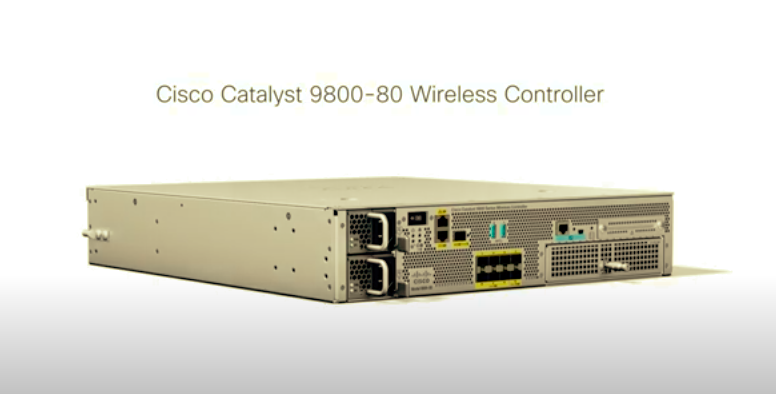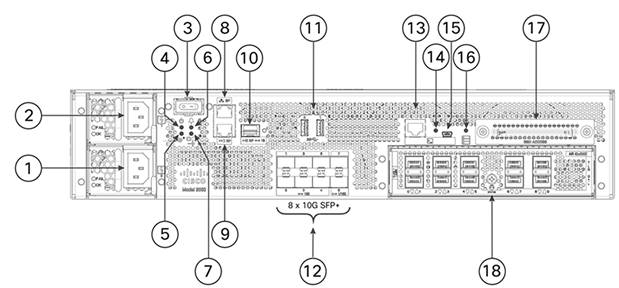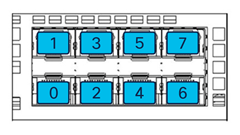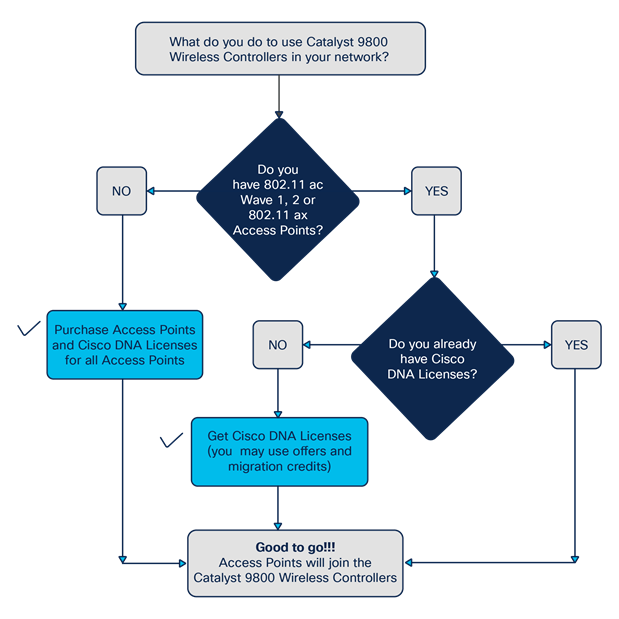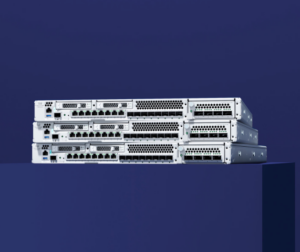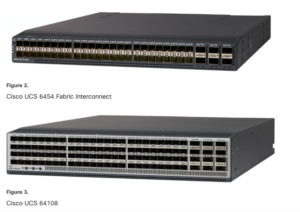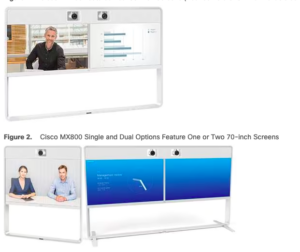Cisco Catalyst 9800-80 Wireless Controller
Built from the ground up for intent-based networking and Cisco DNA, Cisco Catalyst 9800 Series Wireless Controllers are Cisco IOS XE based and integrate the RF excellence of Cisco Aironet access points, creating a best-in-class wireless experience for your evolving and growing organization. The 9800 Series is built on an open and programmable architecture with built-in security, streaming telemetry, and rich analytics.
The Cisco Catalyst 9800 Series Wireless Controllers are built on the three pillars of network excellence—always on, secure, and deployed anywhere—which strengthen the network by providing the best wireless experience without compromise while saving time and money.
The Cisco Catalyst 9800-80 is a modular wireless controller with optional 100 Gigabit Ethernet (G) modular uplinks and seamless software updates for large enterprises and campuses. It is feature rich and enterprise ready to power your business-critical operations and transform end-customer experiences:
● High availability and seamless software updates, enabled by hot patching, keep your clients and services always on in planned and unplanned events.
● Secure air, devices, and users with the Cisco Catalyst 9800-80. Wireless infrastructure becomes the strongest first line of defense with Cisco Encrypted Traffic Analytics (ETA) and Software-Defined Access (SD-Access). The controller comes with built-in security: Secure Boot, runtime defenses, image signing, integrity verification, and hardware authenticity.
● Built on a modular operating system, the 9800-80 features open and programmable APIs that enable automation of day-0 to day-N network operations. Model-driven streaming telemetry provides deep insights into the health of your network and clients.
● Cisco User Defined Network, a feature available in Cisco DNA Center, allows IT to give end users control of their very own wireless network partition on a shared network. End users can then remotely and securely deploy their devices on this network. Perfect for university dormitories or extended hospital stays, Cisco User Defined Network grants both device security and control, allowing each user to choose who can connect to their network.
● The Wi-Fi 6 readiness dashboard is a new dashboard in the Assurance menu of Cisco DNA Center. It will look through the inventory of all devices on the network and verify device, software, and client compatibility with the new Wi-Fi 6 standard. After upgrading, advanced wireless analytics will indicate performance and capacity gains as a result of the Wi-Fi 6 deployment. This is an incredible tool that will help your team define where and how the wireless network should be upgraded. It will also give you insights into the access point distribution by protocol (802.11 ac/n/abg), wireless airtime efficiency by protocol, and granular performance metrics.
● With Cisco In Service Software Upgrade (ISSU), network downtime during a software update or upgrade is a thing of the past. ISSU is a complete image upgrade and update while the network is still running. The software image—or patch—is pushed onto the wireless controller while traffic forwarding continues uninterrupted. All access point and client sessions are retained during the upgrade process. With just a click, your network automatically upgrades to the newest software.
Table 1. Key features
Metric | Value |
Maximum number of access points | Up to 6000 |
Maximum number of clients | 64,000 |
Maximum throughput | Up to 80 Gbps |
Maximum WLANs | 4096 |
Maximum VLANs | 4096 |
Maximum site tags | 6000 |
Maximum Flex APs per site | 100 |
Maximum policy tags | 6000 |
Maximum RF tags | 6000 |
Maximum RF profiles | 12000 |
Maximum policy profiles | 1000 |
Maximum Flex profiles | 6000 |
Fixed uplinks | 8x 10G or 6x 10G + 2x 1G SFP+/SFP |
Modular uplinks (optional) | The supported uplink modules are: ● C9800-18X1GE(=) ● C9800-10X10GE(=) ● C9800-1X40GE(=) ● C9800-2X40GE(=) ● C9800-1X100GE(=) The uplink modules are hot-swappable. Supports 10G, 40G, and 100G QSFP transceivers |
Redundant power supply | AC or DC power supply |
Maximum power consumption with modules | 600W |
Deployment modes | Centralized, Cisco FlexConnect, and Fabric Wireless (SD-Access) |
Form factor | 2RU |
License | Smart License enabled |
Operating system | Cisco IOS XE |
Management | Cisco DNA Center, Cisco Prime Infrastructure, integrated WebUI, and third party (open standards APIs)* |
Interoperability | AireOS-based controllers* |
Policy engine | Cisco Identity Services Engine (ISE)* |
Location platform | Cisco Connected Mobile Experiences (CMX)/Cisco Spaces* |
Access points | Aironet 802.11ac Wave 1 and Wave 2 access points, Cisco Catalyst 9100 802.11ax access points |
Always on
Seamless software updates enable faster resolution of critical issues, introduction of new access points with zero downtime, and flexible software upgrades. Stateful switchover (SSO) with 1:1 active standby and N+1 redundancy keeps your network, services, and clients always on, even in unplanned events. Cisco Advanced Wireless Intrusion Prevention System (aWIPS) is a complete wireless security solution that uses the Cisco Unified Access infrastructure to detect, locate, mitigate, and contain wired and wireless rogues and threats.
Secure
Secure air, devices, and users with the Cisco Catalyst 9800-80 Wireless Controller. Wireless infrastructure becomes the strongest first line of defense with ETA and SD-Access. The controller comes with built-in security: Secure Boot, runtime defenses, image signing, integrity verification, and hardware authenticity.
Open and programmable
The controller is built on the Cisco IOS XE operating system, which offers a rich set of open standards-based programmable APIs and model-driven telemetry that provide an easy way to automate day-0 to day-N network operations.
Table 2. Physical dimensions
Dimension | Value |
Width | 17.3 inches (43.94 cm) |
Depth | 20.5 inches (52.07 cm) |
Height | 3.47 inches (8.81 cm) |
Weight | 31.5 lb (14.29 kg) |
Front panel
Front panel
Front panel components
10G/1G ports
Table 3. Descriptions of front-panel components
Label | Component |
1 | Power supply (PEM 0) |
2 | Power supply (PEM 1) |
3 | Power (PWR) switch |
4 | PWR: Power LED |
5 | SYS: System LED |
6 | ALM: Alarm LED |
7 | HA: High-availability LED |
8 | SP: RJ-45 10/100/1000 management Ethernet port |
9 | RP: RJ-45 10/100/1000 redundancy Ethernet port |
10 | RP: 1G SFP port (the only SFPs supported on the RP port are GLC-SX-MMD and GLC-LH-SMD) |
11 | USB ports 0 and 1 |
12 | Fixed: 6x 10G and 2x 1G or 8x 10G |
13 | CON: RJ-45 compatible console port |
14 | LINK: RJ-45 connector LED |
15 | CON: Mini USB console port |
16 | SSD: SSD activity LED |
17 | SSD access |
18 | Modular uplink |
Table 4. Ports and their purposes
Port | Purpose |
1x RJ-45 console port | Console port for out-of-band management |
1x USB 3.0 console port | Console port for out-of-band management |
2x USB 3.0 ports | USB 3.0 ports for plugging in external memory |
1x RJ-45 management port | Management port for out-of-band management. Also known as service port. |
1x RJ-45 redundancy port | Redundancy port used for SSO |
1x SFP Gigabit Ethernet redundancy port | ● Redundancy port used for SSO; works with Cisco supported SFPs (GLC-LH-SMD and GLC-SX-MMD) for RP port |
Fixed uplink: 10G SFP+/1G SFP ports | The ports are fixed uplinks, which can be used as 8x 10G SFP+ or 6x 10G plus 2x 1G |
Modular uplink | The supported uplink modules are: ● C9800-18X1GE(=) ● C9800-10X10GE(=) ● C9800-1X40GE(=) ● C9800-2X40GE(=) ● C9800-1X100GE(=) The uplink modules are hot-swappable. Supports 10G, 40G, and 100G QSFP transceivers |
Front panel LEDs
Table 5. Front panel LEDs
LED | Color | Function |
Power PWR | Green | Green if all power rails are within spec |
STATUS SYS | Green | On: IOS has boot complete Blinking: IOS boot in progress |
Amber | On: System crash Blinking: Secure boot failure Off: ROMMON boot | |
ALARM ALM | Green | On: ROMMON boot complete Blinking: System upgrade in progress |
Amber | On: ROMMON boot and SYSTEM bootup Blinking: Temperature error and secure boot failure | |
HIGH AVAILABILITY HA | Green | On: HA active Blinking: HA standby hot |
Amber | Slow blink: Booted with HA standby cold Fast blink: HA maintenance | |
USB CON ENABLED EN | Green | When LED is lit, USB console is enabled (RJ-45 console is disabled) |
10/100/1000 RJ45 I/F LINK | Green | Solid green indicates link |
10/100/1000 RJ45 I/F ACTIVITY | Green | Flashing green indicates activity |
SSD Activity SSD | Green | Indicates active use of the hard disk SSD memory devices in the unit |
Rear panel
Rear panel
● The chassis has a front-to-rear airflow.
● Four internal fans draw cooling air in through the front of the chassis and across the internal components to maintain an acceptable operating temperature.
● The fans are located at the rear of the chassis.
● The fans are numbered from 0 to 3, right to left.
The 9800-80 controller ships with redundant power supply units, either AC or DC, based on the customer’s choice.
The Power Entry Module (PEM) provides redundant power to the system, and the 9800-80 can operate continuously with only a single PEM installed. The PEMs are hot-swappable, and replacement of a single PEM can be made without power interruption to the system. All external connections to the PEMs are made from the rear panel of the chassis, and they are removed or inserted from the rear. The main power switch for the unit is located directly next to the PEMs on the rear of the chassis.
Table 6. Power supply options
Power supply condition | Green (OK) LED status | Amber (Fail) LED status |
No AC power to all power supplies | Off | Off |
Power supply failure (includes over voltage, over current, over temperature, and fan failure) | Off | Red for power supply failure Amber for fan failure |
Power supply warning events in which the power supply continues to operate (high temperature, high power, and slow fan) | Off | 1 Hz blinking |
Note: Redundancy is supported with the same power supply types.
● All 1G, 10G, 40G, and 100G ports can be configured independently.
● Online Insertion and Removal (OIR) for SFP, SFP+, and QSFP.
● Modules are hot-swappable.
Table 7. SFPs supported
Type | Modules supported |
Small Form-Factor Pluggable (SFP) | GLC-BX-D |
GLC-BX-U | |
GLC-EX-SMD | |
GLC-LH-SMD | |
GLC-SX-MMD | |
GLC-ZX-SMD | |
GLC-TE | |
Enhanced SFP (SFP+) | SFP-10G-AOC1M |
SFP-10G-AOC2M | |
SFP-10G-AOC3M | |
SFP-10G-AOC5M | |
SFP-10G-AOC7M | |
SFP-10G-AOC10M | |
SFP-10G-SR | |
SFP-10G-SR-S | |
SFP-10G-SR-X | |
SFP-10G-LR | |
SFP-10G-LRM | |
SFP-10G-LR-X | |
SFP-10G-ER | |
SFP-10G-ZR | |
SFP-H10GB-CU1M | |
SFP-H10GB-CU1.5M | |
SFP-H10GB-CU2M | |
SFP-H10GB-CU2.5M | |
SFP-H10GB-CU3M | |
SFP-H10GB-CU5M | |
SFP-H10GB-ACU7M | |
SFP-H10GB-ACU10M | |
DWDM-SFP10G-30.33 – DWDM-SFP10G-61.41 | |
Quad SFP (QSFP) | QSFP-40G-SR4 |
QSFP-40G-LR4 | |
QSFP-40GE-LR4 | |
QSFP-40G-ER4 | |
QSFP-40G-SR4-S | |
QSFP-40G-LR4-S | |
QSFP-40G-SR-BD | |
QSFP-40G-BD-RX | |
QSFP-100G-SR4-S | |
QSFP-100G-LR4-S |
Cisco IOS XE opens a completely new paradigm in network configuration, operation, and monitoring through network automation. Cisco’s automation solution is open, standards-based, and extensible across the entire lifecycle of a network device. The various mechanisms that bring about network automation are outlined below, based on a device lifecycle.
● Automated device provisioning: This is the ability to automate the process of upgrading software images and installing configuration files on Cisco access points when they are being deployed in the network for the first time. Cisco provides turnkey solutions such as Plug and Play (PnP) that enable an effortless and automated deployment.
● API-driven configuration: Modern wireless controllers such the Cisco Catalyst 9800-80 Wireless Controller support a wide range of automation features and provide robust open APIs over Network Configuration Protocol (NETCONF) using YANG data models for external tools, both off-the-shelf and custom built, to automatically provision network resources.
● Granular visibility: Model-driven telemetry provides a mechanism to stream data from a wireless controller to a destination. The data to be streamed is driven through subscription to a data set in a YANG model. The subscribed data set is streamed out to the destination at configured intervals. Additionally, Cisco IOS XE enables the push model, which provides near-real-time monitoring of the network, leading to quick detection and rectification of failures.
● Seamless software upgrades and patching: To enhance OS resilience, Cisco IOS XE supports patching, which provides fixes for critical bugs and security vulnerabilities between regular maintenance releases. This support allows customers to add patches without having to wait for the next maintenance release.
Always on
● High availability: Stateful switchover with 1:1 active standby and N+1 redundancy keeps your network, services, and clients always on, even in unplanned events.
● Software Maintenance Upgrades (SMUs) with hot patching: Patching allows for a patch to be installed as a bug fix without bringing down the entire network and eliminates the need to requalify an entire software image. The SMU is a package that can be installed on a system to provide a patch fix or security resolution to a released image. SMUs allow you to address the network issue quickly while reducing the time and scope of the testing required. The Cisco IOS XE platform internally validates the SMU compatibility and does not allow you to install incompatible SMUs. All SMUs are integrated into the subsequent Cisco IOS XE Software maintenance releases.
● Intelligent rolling access point upgrades and seamless multisite upgrades: The Cisco Catalyst 9800-80 Wireless Controller comes equipped with intelligent rolling access point upgrades to simplify network operations. Multisite upgrades can now be done in stages, and access points can be upgraded intelligently without restarting the entire network.
● Standby monitoring of Cisco Catalyst 9800 Wireless Controllers in high-availability mode enables monitoring the health of the system on a standby controller in a high-availability pair using programmatic interfaces (NETCONF/YANG, RESTCONF) and CLIs without going through the active controller. For more details refer to the technical documentation.
● In-Service Software Upgrade (ISSU): ISSU is a complete image upgrade/update with zero downtime while the network is still on. The software image or a patch is pushed onto the wireless controller while traffic forwarding continues uninterrupted. All access point and client sessions are retained during the upgrade process.
With just a click, your network automatically upgrades to the newest software. Your backup 9800 controller receives the new software that is pushed via the active 9800 controller. The backup 9800 controller becomes active and takes over your network, while your previously active 9800 turns into a backup 9800 controller and processes the software upgrade. Using an intelligent RF-based rolling access point upgrade, all access points are upgraded in a staggered fashion without impacting any wireless session. This procedure is carried out without any manual intervention natively from the controller and without the need for an external orchestrator or additional licenses.
Security
● Encrypted Traffic Analytics (ETA): ETA is a unique capability for identifying malware in encrypted traffic coming from the access layer. Since more and more traffic is being encrypted, the visibility this feature provides related to threat detection is critical for keeping your network secure at different layers.
● Trustworthy systems: Cisco Trust Anchor Technologies provide a highly secure foundation for Cisco products. With the Cisco Catalyst 9800-80, these trustworthy systems help assure hardware and software authenticity for supply chain trust and strong mitigation against man-in-the-middle attacks on software and firmware. Trust Anchor capabilities include:
◦ Image signing: Cryptographically signed images provide assurance that the firmware, BIOS, and other software are authentic and unmodified. As the system boots, its software signatures are checked for integrity.
◦ Secure Boot: Cisco Secure Boot technology anchors the boot sequence chain of trust to immutable hardware, mitigating threats against a system’s foundational state and the software that is to be loaded, regardless of a user’s privilege level. It provides layered protection against the persistence of illicitly modified firmware.
◦ Cisco trust anchor module: A tamper-resistant, strong cryptographic, single-chip solution hardware uniquely identifies the product so that its origin can be confirmed to Cisco, providing assurance that the product is genuine.
◦ Cisco Wireless Intrusion Prevention System (WIPS): WIPS offers advanced network security to detect, locate, mitigate, and contain any intrusion or threat on your wireless network. It can monitor and detect wireless network anomalies, unauthorized access, and RF attacks. A new, dedicated classification engine for rogues and aWIPS is built on Cisco DNA Center. A fully integrated stack for the WIPS solution includes Cisco DNA Center, a Cisco Catalyst 9800 controller, Wave 2, and Cisco Catalyst 9100 Access Point. This new architecture provides improved detection and security, simplicity, and ease of use, and reduced false positive alarms.
Flexible NetFlow
● Flexible NetFlow (FNF): Cisco IOS FNF is the next generation in flow visibility technology, allowing optimization of the network infrastructure, reducing operating costs, and improving capacity planning and security incident detection with increased flexibility and scalability.
Application visibility and control
● Next-Generation Network-Based Application Recognition (NBAR2): NBAR2 enables advanced application classification techniques, with up to 1400 predefined and well-known application signatures and up to 150 encrypted applications on the Cisco Catalyst 9800-80. Some of the most popular applications included are Skype, Office 365, Microsoft Lync, Cisco Webex, and Facebook. Many others are already predefined and easy to configure. NBAR2 provides the network administrator with an important tool to identify, control, and monitor end-user application usage while helping ensure a quality user experience and securing the network from malicious attacks. It uses FNF to report application performance and activities within the network to any supported NetFlow collector, such as Cisco Prime, Stealthwatch, or any compliant third-party tool.
Quality of service
● Superior Quality of Service (QoS): QoS technologies are tools and techniques for managing network resources and are considered the key enabling technologies for the transparent convergence of voice, video, and data networks. QoS on the Cisco Catalyst 9800-80 consists of classification of traffic based on packet data as well as application recognition and traffic control actions such as dropping, marking and policing. A modular QoS command-line framework provides consistent platform-independent and flexible configuration behavior. The 9800-80 also supports policies at two levels of target: BSSID as well as client. Policy assignment can be granular down to the client level.
Smart operation
● Bluetooth ready: The Cisco Catalyst 9800-80 has hardware support to connect a Bluetooth dongle to the controller, enabling you to use this wireless interface as a management port. This port functions as an IP management interface and can be used for configuration and troubleshooting using WebUI or the Command-Line Interface (CLI), and to transfer images and configurations.
● WebUI: WebUI is an embedded GUI-based device-management tool that provides the ability to provision the device, simplifying device deployment and manageability and enhancing the user experience. WebUI comes with the default image. There is no need to enable anything or install any license on the device. You can use WebUI to build a day-0 and day-1 configuration and from then on monitor and troubleshoot the device without having to know how to use the CLI.
Table 8. Specifications
Item | Specification |
|
Wireless | IEEE 802.11a, 802.11b, 802.11g, 802.11d, WMM/802.11e, 802.11h, 802.11n, 802.11k, 802.11r, 802.11u, 802.11w, 802.11ac Wave 1 and Wave 2, 802.11ax |
|
Wired, switching, and routing | IEEE 802.3 10BASE-T, IEEE 802.3u 100BASE-TX, 1000BASE-T, 1000BASE-SX, 1000-BASE-LH, IEEE 802.1Q VLAN tagging, IEEE 802.1AX Link Aggregation |
|
Data standards | ● RFC 768 User Datagram Protocol (UDP) ● RFC 791 IP ● RFC 2460 IPv6 ● RFC 792 Internet Control Message Protocol (ICMP) ● RFC 793 TCP ● RFC 826 Address Resolution Protocol (ARP) ● RFC 1122 Requirements for Internet Hosts ● RFC 1519 Classless Interdomain Routing (CIDR) ● RFC 1542 Bootstrap Protocol (BOOTP) ● RFC 2131 Dynamic Host Configuration Protocol (DHCP) ● RFC 5415 Control and Provisioning of Wireless Access Points (CAPWAP) Protocol ● RFC 5416 CAPWAP Binding for 802.11 |
|
Security standards | ● Wi-Fi Protected Access (WPA) ● IEEE 802.11i (WPA2, RSN) ● Wi-Fi Protected Access 3 (WPA3) ● RFC 1321 MD5 Message-Digest Algorithm ● RFC 1851 Encapsulating Security Payload (ESP) Triple DES (3DES) Transform ● RFC 2104 HMAC: Keyed-Hashing for Message Authentication ● RFC 2246 TLS Protocol Version 1.0 ● RFC 2401 Security Architecture for the Internet Protocol ● RFC 2403 HMAC-MD5-96 within ESP and AH ● RFC 2404 HMAC-SHA-1-96 within ESP and AH ● RFC 2405 ESP DES-CBC Cipher Algorithm with Explicit IV ● RFC 2407 Interpretation for Internet Security Association Key Management Protocol (ISAKMP) ● RFC 2408 ISAKMP ● RFC 2409 Internet Key Exchange (IKE) ● RFC 2451 ESP CBC-Mode Cipher Algorithms ● RFC 3280 Internet X.509 Public Key Infrastructure (PKI) Certificate and Certificate Revocation List (CRL) Profile ● RFC 4347 Datagram Transport Layer Security (DTLS) ● RFC 5246 TLS Protocol Version 1.2 |
|
Encryption standards | ● Static Wired Equivalent Privacy (WEP) RC4 40, 104 and 128 bits ● Advanced Encryption Standard (AES): Cipher Block Chaining (CBC), Counter with CBC-MAC (CCM), Counter with CBC Message Authentication Code Protocol (CCMP) ● Data Encryption Standard (DES): DES-CBC, 3DES ● Secure Sockets Layer (SSL) and Transport Layer Security (TLS): RC4 128-bit and RSA 1024- and 2048-bit ● DTLS: AES-CBC ● IPsec: DES-CBC, 3DES, AES-CBC ● 802.1AE MACsec encryption |
|
Authentication, Authorization, and Accounting (AAA) | ● IEEE 802.1X ● RFC 2548 Microsoft Vendor-Specific RADIUS Attributes ● RFC 2716 Point-to-Point Protocol (PPP) Extensible Authentication Protocol (EAP)-TLS ● RFC 2865 RADIUS Authentication ● RFC 2866 RADIUS Accounting ● RFC 2867 RADIUS Tunnel Accounting ● RFC 2869 RADIUS Extensions ● RFC 3576 Dynamic Authorization Extensions to RADIUS ● RFC 5176 Dynamic Authorization Extensions to RADIUS ● RFC 3579 RADIUS Support for EAP ● RFC 3580 IEEE 802.1X RADIUS Guidelines ● RFC 3748 Extensible Authentication Protocol (EAP) ● Web-based authentication ● TACACS support for management users |
|
Management standards | ● Simple Network Management Protocol (SNMP) v1, v2c, v3 ● RFC 854 Telnet ● RFC 1155 Management Information for TCP/IP-based Internets ● RFC 1156 MIB ● RFC 1157 SNMP ● RFC 1213 SNMP MIB II ● RFC 1350 Trivial File Transfer Protocol (TFTP) ● RFC 1643 Ethernet MIB ● RFC 2030 Simple Network Time Protocol (SNTP) ● RFC 2616 HTTP ● RFC 2665 Ethernet-Like Interface Types MIB ● RFC 2674 Definitions of Managed Objects for Bridges with Traffic Classes, Multicast Filtering, and Virtual Extensions ● RFC 2819 Remote Monitoring (RMON) MIB ● RFC 2863 Interfaces Group MIB ● RFC 3164 Syslog ● RFC 3414 User-Based Security Model (USM) for SNMPv3 ● RFC 3418 MIB for SNMP ● RFC 3636 Definitions of Managed Objects for IEEE 802.3 MAUs ● RFC 4741 Base NETCONF protocol ● RFC 4742 NETCONF over SSH ● RFC 6241 NETCONF ● RFC 6242 NETCONF over SSH ● RFC 5277 NETCONF event notifications ● RFC 5717 Partial Lock Remote Procedure Call ● RFC 6243 With-Defaults capability for NETCONF ● RFC 6020 YANG ● Cisco private MIBs |
|
Management interfaces | ● Web-based: HTTP/HTTPS ● Command-line interface: Telnet, Secure Shell (SSH) Protocol, serial port ● SNMP ● NETCONF |
|
Hard Disk Drives (HDD) | ● SATA Solid-State Drive (SSD) ● 240 GB of memory |
|
Environmental conditions supported | Operating temperature: ● Normal: 0° to 40° C (32° to 104°F) ● Short term:0° to 50° C (32° to 122°F) Nonoperating temperature: ● -40° to 65° C (-104° to 149°F) Operating humidity: ● Normal: 10% to 90% noncondensing ● Short term: 5% to 90% noncondensing Nonoperating temperature humidity: ● 5% to 93% at 82°F (28°C) Operating altitude: ● Appliance operating: 0 to 3000 m (0 to 10,000 ft) ● Appliance nonoperating: 0 to 12,192 m (0 to 40,000 ft) Electrical input: ● AC input frequency range: 47 to 63 Hz ● AC input range: 90 to 264 VAC with AC PEM ● DC input range: -40 to -72 VDC with DC PEM Maximum power with modules: 600W Heat dissipation: 2047 BTU/hr Sound power level measure: ● A-weighted sound power level is 70.5 LpAm (dBA) @ 27C nominal operation |
|
Regulatory compliance | Safety: ● UL/CSA 60950-1 ● IEC/EN 60950-1 ● AS/NZS 60950.1 ● CAN/CSA-C22.2 No. 60950-1 |
|
EMC – Emissions: ● FCC 47CFR15 ● AS/NZS CISPR 22 ● CISPR 22 ● EN55022/EN55032 (EMI-1) ● ICES-003 ● VCCI ● KN 32 (EMI-2) ● CNS-13438 | Class A | |
EMC – Emissions: ● EN61000-3-2 Power Line Harmonics (EMI-3) ● EN61000-3-3 Voltage Changes, Fluctuations, and Flicker (EMI-3) |
| |
EMC – Immunity: ● IEC/EN61000-4-2 Electrostatic Discharge Immunity ● IEC/EN61000-4-3 Radiated Immunity ● IEC/EN61000-4-4 EFT-B Immunity (AC Power Leads) ● IEC/EN61000-4-4 EFT-B Immunity (DC Power Leads) ● IEC/EN61000-4-4 EFT-B Immunity (Signal Leads) ● IEC/EN61000-4-5 Surge AC Port ● IEC/EN61000-4-5 Surge DC Port ● IEC/EN61000-4-5 Surge Signal Port ● IEC/EN61000-4-6 Immunity to Conducted Disturbances ● IEC/EN61000-4-8 Power Frequency Magnetic Field Immunity ● IEC/EN61000-4-11 Voltage Dips, Short Interruptions, and Voltage Variations ● K35 (EMI-2) |
| |
| EMC (ETSI/EN) ● EN 300 386 Telecommunications Network Equipment (EMC) (EMC-3) ● EN55022 Information Technology Equipment (Emissions) ● EN55024/CISPR 24 Information Technology Equipment (Immunity) ● EN50082-1/EN61000-6-1 Generic Immunity Standard (EMC-4) |
|
The Cisco Catalyst 9800-80 runs on Cisco IOS XE Software version 16.10.1 or later. This software release includes all the features listed earlier in the Platform Benefits section.
No licenses are required to boot up a Cisco Catalyst 9800 Series Wireless Controller. However, in order to connect any access points to the controller, Cisco DNA software subscriptions are required. To be entitled to connect to a 9800 Series controller, each access point requires a Cisco DNA subscription license.
Determining license requirements for access points connecting to Cisco Catalyst 9800 Series Wireless Controllers
The access points connecting to the Cisco Catalyst 9800 Series have new and simplified software subscription packages.
They can support both tiers of Cisco DNA software: Cisco DNA Essentials and Cisco DNA Advantage.
Cisco DNA software subscriptions provide Cisco innovations on the access point. They also include perpetual Network Essentials and Network Advantage licensing options, which cover wireless fundamentals such as 802.1X authentication, QoS, and PnP; telemetry and visibility; and single-sign-on, as well as security controls.
Cisco DNA subscription software has to be purchased for a 3-, 5-, or 7-year subscription term. Upon expiration of the subscription, the Cisco DNA features will expire, whereas the Network Essentials and Network Advantage features will remain.
For the full feature list of Cisco DNA Software, including the perpetual Network Essentials and Network advantage, please see the feature matrix: https://www.cisco.com/c/m/en_us/products/software/dna-subscription-wireless/en-sw-sub-matrix-wireless.html?oid=porew018984.
Two modes of licensing are available:
● Cisco Smart Licensing is a flexible licensing model that provides you with an easier, faster, and more convenient way to purchase and manage software across the Cisco portfolio and across your organization. And it’s secure- you control what users can access. With Smart Licensing you get:
◦ Easy Activation: Smart licensing establishes a pool of software licenses that can be used across the entire organization-no more PAKs (Product Activation Keys).
◦ Unified Management: My Cisco Entitlements (MCE) provides a complete view into all of your Cisco Products and services in an easy-to-use portal, so you always know what you have and what you are using.
◦ License Flexibility: Your software is not node-locked to your hardware, so you can easily use and transfer licenses as needed.
◦ To use Smart Licensing, you must first set up a Smart Account on Cisco Software Central (software.cisco.com).
For more detailed overview on Cisco Licensing, go to cisco.com/go/licensingguide
● Specific License Reservation (SLR) is a feature used in highly secure networks. It provides a method for customers to deploy a software license on a device (Product Instance) without communicating usage information to Cisco. There is no communication with Cisco or a satellite. The licenses are reserved for every controller. It is node-based licensing.
Four levels of license are supported on the Cisco Catalyst 9800 Series Wireless Controllers. The controllers can be configured to function at any one of the four levels:
● Cisco DNA Essentials: At this level the Cisco DNA Essentials feature set will be supported.
● Cisco DNA Advantage: At this level the Cisco DNA Advantage feature set will be supported.
● NE: At this level the Network Essentials feature set will be supported. This is available with Cisco DNA Essentials.
● NA: At this level the Network Advantage feature set will be supported. This is available with Cisco DNA Advantage.
For customers who purchase Cisco DNA Essentials, Network Essentials will be supported and will continue to function even after term expiration. And for customers who purchase Cisco DNA Advantage, Network Advantage will be supported and will continue to function even after term expiration.
Initial bootup of the controller will be at the Cisco DNA Advantage level.
For questions, contact the Cisco Catalyst 9800 Series Wireless Controllers Licensing mailer group at ask-catalyst9800licensing.
Managing licenses with Smart Accounts
Creating Smart Accounts by using the Cisco Smart Software Manager (SSM) enables you to order devices and licensing packages and also manage your software licenses from a centralized website. You can set up the Smart Account to receive daily email alerts and to be notified of expiring add-on licenses that you want to renew. A Smart Account is mandatory for the Cisco Catalyst 9800 Series controllers. For more information on Smart Accounts, refer to https://www.cisco.com/go/smartaccounts.
Find warranty information on Cisco.com at the Product Warranties page.
Cisco 1-year limited hardware warranty terms
The following are terms applicable to your hardware warranty. Your embedded software is subject to the Cisco General Terms (link available below) and/or any General Terms or specific software warranty terms for additional software products loaded on the device.
Duration of hardware warranty: One (1) year.
Replacement, repair, or refund procedure for hardware: Cisco or its service center will use commercially reasonable efforts to ship a replacement part within ten (10) working days after receipt of the Return Materials Authorization (RMA) request. Actual delivery times may vary depending on customer location.
Cisco reserves the right to refund the purchase price as its exclusive warranty remedy.
Cisco environmental sustainability
Information about Cisco’s environmental sustainability policies and initiatives for our products, solutions, operations, and extended operations or supply chain is provided in the “Environment Sustainability” section of Cisco’s Corporate Social Responsibility (CSR) Report.
Reference links to information about key environmental sustainability topics (mentioned in the “Environment Sustainability” section of the CSR Report) are provided in the following table:
Table 9. Links to sustainability information
Sustainability topic | Reference |
Information on product material content laws and regulations | |
Information on electronic waste laws and regulations, including products, batteries, and packaging | |
Sustainability inquiries | Contact: csr_inquiries@cisco.com |
Cisco makes the packaging data available for informational purposes only. It may not reflect the most current legal developments, and Cisco does not represent, warrant, or guarantee that it is complete, accurate, or up to date. This information is subject to change without notice.
Table 10. Ordering information
Type | Product ID | Description |
Wireless controller | C9800-80-K9 | Cisco Catalyst 9800-80 Wireless Controller |
LIC-C9800-DTLS-K9 | Cisco Catalyst 9800 Series Wireless Controller DTLS License | |
Accessories, spares | C9800-AC-1100W= | Cisco Catalyst Wireless Controller 1100 AC Power Supply |
C9800-DC-950W= | Cisco Catalyst Wireless Controller 950W DC Power Supply | |
C9800-18X1GE(=) | Cisco Catalyst 9800-80 GE Module | |
C9800-10X10E(=) | Cisco Catalyst 9800-80 10 GE Module | |
C9800-1X40GE(=) | Cisco Catalyst 9800-80 1 Port 40 GE Module | |
C9800-2X40GE(=) | Cisco Catalyst 9800-80 2 Ports 40 GE Module | |
C9800-1X100GE(=) | Cisco Catalyst 9800-80 1 Port 100 GE Module |
Flexible payment solutions to help you achieve your objectives
Cisco Capital makes it easier to get the right technology to achieve your objectives, enable business transformation, and stay competitive. We can help you reduce the total cost of ownership, conserve capital, and accelerate growth. In more than 100 countries, our flexible payment solutions can help you acquire hardware, software, services and complementary third-party equipment in easy, predictable payments.
Learn more.

